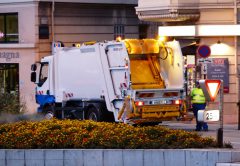Dozens of startups are striving to enter the autonomous vehicle market, hoping to bring innovation to the next generation of automobiles. From software companies that focus on artificial intelligence to hardware manufacturers that are building essential components, AV technology has been a boon for entrepreneurs.
Not all startups are created equal, however. While there are dozens of companies tackling the same group of problems, very few are ready to deploy their offerings. This is due to the immense complexities associated with self-driving technology, whether it’s the algorithm under the hood or the sensor on top.
Innoviz Technologies, a startup out of Kfar Saba, Israel, has zeroed in on one key challenge: LiDAR. The company is developing low-cost solid state LiDAR solutions for the AV market. Its products are not yet ready to be deployed in motor vehicles, but the firm’s progress has already attracted $82 million from investors, including Aptiv (formerly Delphi Automotive), Magna International, Samsung Catalyst and Softbank Ventures Korea.
“We got amazing feedback from companies that visited us (at CES) and realized what we have is already working well,” said Omer Keilaf, co-founder and CEO of Innoviz.
Solving Problems
Keilaf said that one of the problems with LiDAR technology is that it can be degraded by cross interference if multiple cars are close together. From the beginning he wanted Innoviz’s solution to work seamlessly in a multi-LiDAR environment.
“When we started this company the first thing we did was try to understand what are the main challenges behind LiDAR,” said Keilaf. “We had a certain kind of cost on one side. We decided no matter what we do, if you want to have a solution that’s viable for the mass market, we need to make sure that we can sell it at one point for $100. Maybe not in the first two or three years where the volume is not that high, but you cannot design a LiDAR if you do not believe that at some point you can’t sell it for $100 because it won’t go to mass market.”
Innoviz also wanted to build a sensor that is sensitive enough to collect light from a long distance, but strong enough to endure the blinding rays of the sun, which have been problematic for some LiDAR solutions.
Many companies say they can overcome these obstacles, but Innoviz wanted to prove their accomplishments were applicable beyond the testing phase.
“I think the biggest challenge is not only to show a demo but to actually deliver a product that’s automotive-grade,” said Keilaf. “A product that’s very high-quality and is actually reliable. This is what the OEMs want. They want to count on you to actually deliver a product in two years, which is already automotive-grade and meets all the performance and quality needs. They don’t have any appetite for risk.”
More Than LiDAR
LiDAR may receive the most attention, but Keilaf realizes that self-driving cars will need to equip multiple technologies before they’re deployed.
“I think it’s clear that in order to have high functional safety, you need to rely on different technologies like LiDAR, cameras, radar, sonar and GPS,” he said. “And there’s so much data that OEMs need to analyze. You see cars today that are running those platforms with computers that drive a lot of power and heat. It’s not what we do, but it’s one of the hurdles today.”
About the author:
Louis Bedigian is an experienced journalist and contributor to various automotive trade publications. He is a dynamic writer, editor and communications specialist with expertise in the areas of journalism, promotional copy, PR, research and social networking.



